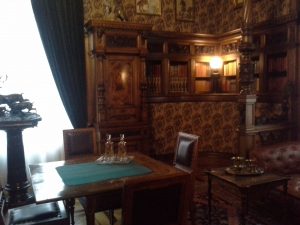It’s Thursday, my first full day in Łódź, Poland, and the weather outside is as frightful as a Sammy Cahn tune. It’s a day of rain, followed by a day of snow, and the roads outside are one big unflavored slushy.
Fortunately, the conference organizers arranged for a tour today of a few local indoor sights. I am walking around the Herbst Palace Museum, the preserved and renovated home of a 19th century textile baron and his family. As the home has a study, a library, and a game room (the original “man cave”), for the first time in my life I am imagining myself as a 19th century textile baron. There are eight conference participants on the tour.
The fact that I am on a tour of a textile baron’s home in Poland, when I would normally be in the middle of a three class day sends the playing hooky thrill up my spine. I am holding a museum brochure and enjoying social history. Life is so good.
OK, life would be better if I didn’t have to fart so badly.
Whenever I travel, whether to India, Ethiopia, or Harrisburg, my stomach and colon go on strike, refusing to perform a natural and ritualistic duty of elimination that typically takes place in the morning. In an attempt to circumvent this unpleasantness I spent last night eating every piece of fruit and vegetable in my house. And so, I gobbled up persimmons, oranges, chick peas, peppers, olives, and an entire head of broccoli.
It’s the broccoli that’s giving me the trouble at the moment, I expect.
Now, in the Herbst House, I slide into several rooms to avoid others, my stomach distending and groaning as if it were a living thing and that living thing was being tortured to death by sadistic children. I think my colon is my barometer of zone discomfort. The further away from my comfort zone that I get, the more discomfort my colon wants to cause for a day or two, until I get used to the comfort zone I build there. It’s a pain in the ass.
It’s clear what has to happen, but this museum is as quiet as a morgue. I could try letting out a loud laugh and seeing if I could slip one past the quietness goalie, but I decide against it, as risking a slip is to potentially draw obvious and horrible attention to myself. This humiliation would spark my immediate departure from the Herbst Palace, Łódź, Europe, society, and eventually result in my finding residence in a cave somewhere on the Eurasian Steppe where the local nomadic tribes would leave me alone like the freak that I am, though no doubt cultivate folktales about me as the outcast central European farter.
The problem, I find, is that there is always someone near me. The museum security guards treat us as though we are under extreme suspicion of urinating on an exhibit, slipping a hundred year old coin purse into our pockets, or pushing a pen knife through a priceless armchair. They follow us into each room and give a good, long, obvious glare before accepting momentary innocence and stepping away with an OK, you got away with it this time, nod. .
And then there’s Dwayne. Dwayne doesn’t look the way you just pictured him in your head. Our Dwayne is Taiwanese and is roughly five and a half feet tall. He is shy and soft-spoken, and he widens his eyes in terror when he is directly addressed by another human being. Until he boarded his plane a day ago, Dwayne had never left Taiwan. He is presenting at this conference and he is dressed as though everything outside of Taiwan is labelled The Tundra.
And since Dwayne has found in me a kindred fish out of water, he adheres to me. We are in a mismatched comedy film. He has taken to informing me of random titbits all day: my throat is sore, I am going to clean out my nose now, I met a thief in Warsaw.
When we are all given earphones and digital guides, I have a flash of hope, but the fact that I have no sense of smell and virtually no physical privacy make the act of release nearly impossible. I hold on and maintain my composure by leaning against walls and thinking of small animals with flat, empty stomachs. I stop leaning when a security guard blinks at me angrily.
By the time we get outside, the moments that have been so pressing, of course, are now gone. The need disappears, as you no doubt have experience with. It is one of the many times in my life where I have been certain that bodily organs have brains and cogitate independently.
It will be gone until we hit the next museum, where I walk now in gastrointestinal comfort, Dwayne by my side.

